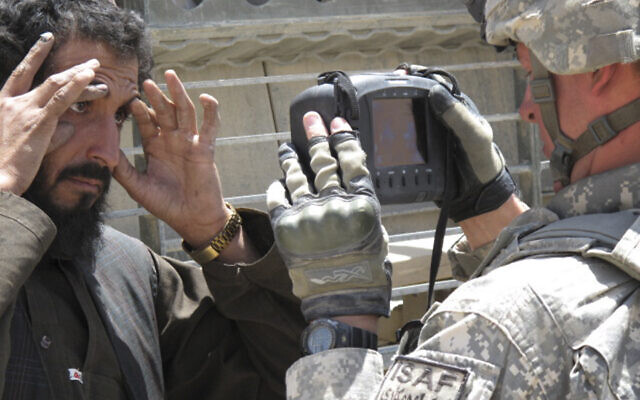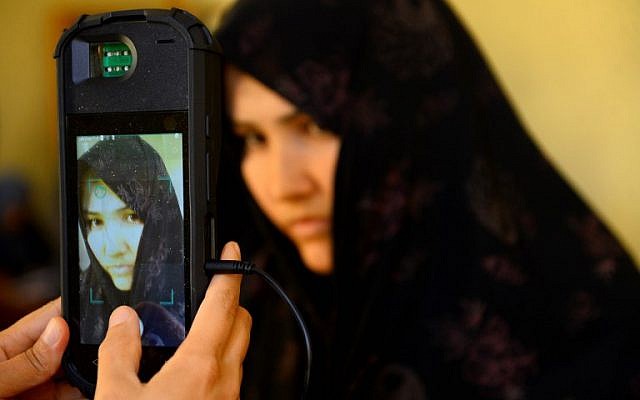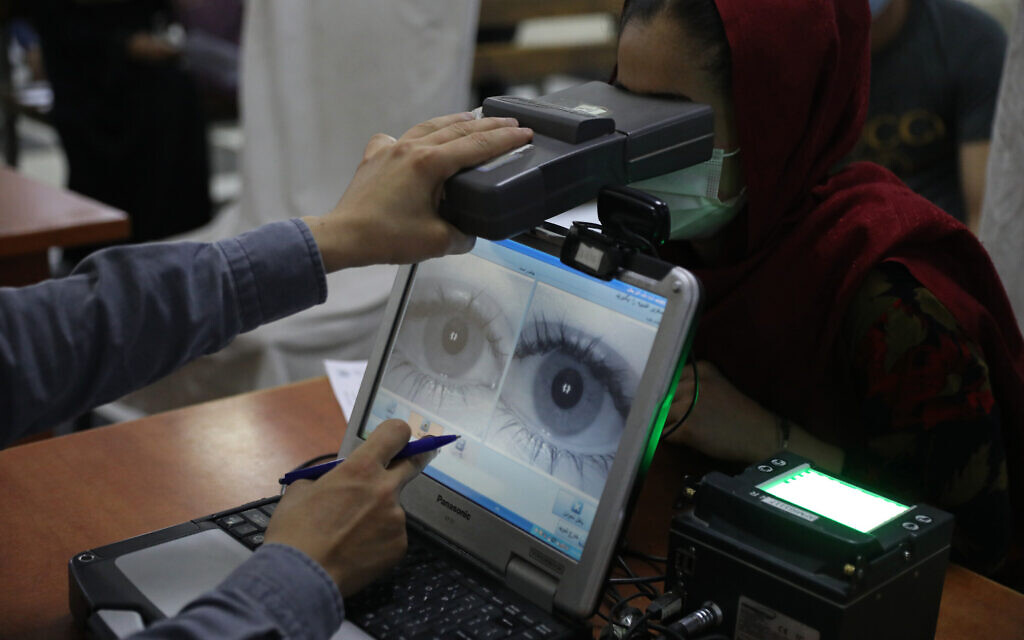[ad_1]
BOSTON (AP) — Over twenty years, america and its allies spent a whole bunch of thousands and thousands of {dollars} constructing databases for the Afghan individuals. The nobly said purpose: Promote regulation and order and authorities accountability and modernize a war-ravaged land.
However within the Taliban’s lightning seizure of energy, most of that digital equipment — together with biometrics for verifying identities — apparently fell into Taliban fingers. Constructed with few data-protection safeguards, it dangers changing into the high-tech jackboots of a surveillance state. Because the Taliban get their governing ft, there are worries it will likely be used for social management and to punish perceived foes.
Placing such information to work constructively — boosting training, empowering ladies, battling corruption — requires democratic stability, and these programs weren’t architected for the prospect of defeat.
“It’s a horrible irony,” mentioned Frank Pasquale, Brooklyn Regulation College scholar of surveillance applied sciences. “It’s an actual object lesson in ‘The street to hell is paved with good intentions.’”
Since Kabul fell August 15, indications have emerged that authorities information could have been utilized in Taliban efforts to establish and intimidate Afghans who labored with the US forces.
Individuals are getting ominous and threatening cellphone calls, texts and WhatsApp messages, mentioned Neesha Suarez, constituent providers director for Democratic Consultant Seth Moulton of Massachusetts, an Iraq Struggle veteran whose workplace is making an attempt to assist stranded Afghans who labored with the US discover a approach out.
A 27-year-old US contractor in Kabul advised The Related Press he and colleagues who developed a US-funded database used to handle military and police payrolls received cellphone calls summoning them to the Protection Ministry. He’s in hiding, altering his location each day, he mentioned, asking to not be recognized for his security.

A Taliban fighter stands guard on the gate of Hamid Karzai Worldwide Airport in Kabul, Afghanistan, September 5, 2021. (AP Photograph/Wali Sabawoon)
In victory, the Taliban’s leaders say they aren’t eager about retribution. Restoring worldwide help and getting foreign-held property unfrozen are a precedence. There are few indicators of the draconian restrictions – particularly on ladies – they imposed once they dominated from 1996 to 2001. There are additionally no indications that Afghans who labored with People have been systematically persecuted.
Ali Karimi, a College of Pennsylvania scholar, is amongst Afghans unready to belief the Taliban. He worries the databases will give inflexible fundamentalist theocrats, recognized throughout their insurgency for ruthlessly killing enemy collaborators, “the identical functionality as a median US authorities company on the subject of surveillance and interception.”
The Taliban are on discover that the world shall be watching how they wield the information.
All Afghans — and their worldwide companions — have an obligation collectively to make sure delicate authorities information solely be used for “growth functions” and never for policing or social management by the Taliban or to serve different governments within the area, mentioned Nader Nadery, a peace negotiator and head of the civil service fee within the former authorities.
Unsure for the second is the destiny of one of the crucial delicate databases, the one used to pay troopers and police.
The Afghan Personnel and Pay System has information on greater than 700,000 safety forces members courting again 40 years, mentioned a senior safety official from the fallen authorities. Its greater than 40 information fields embrace delivery dates, cellphone numbers, fathers’ and grandfathers’ names, fingerprints and iris and face scans, mentioned two Afghan contractors who labored on it, talking on situation of anonymity for worry of retribution.
Solely licensed customers can entry that system, so if the Taliban can’t discover one, they are often anticipated to attempt to hack it, mentioned the previous official, who requested to not be recognized for worry of the security of kin in Kabul. He anticipated Pakistan’s ISI intelligence service, lengthy the Taliban’s patron, to render technical help. US analysts count on Chinese language, Russian and Iranian intelligence additionally to supply such providers.
Initially conceived to struggle payroll fraud, that system was presupposed to interface finally with a strong database on the Protection and Inside ministries modeled on one the Pentagon created in 2004 to attain “id dominance” by accumulating fingerprints and iris and face scans in fight areas.
However the homegrown Afghanistan Automated Biometric Identification Database grew from a device to vet military and police recruits for loyalty to comprise 8.5 million data, together with on authorities foes and the civilian inhabitants. When Kabul fell it was being upgraded, together with the same database in Iraq, underneath a $75 million contract signed in 2018.

Illustrative: A US Military soldier pictures an Afghan traveler at a checkpoint close to a navy base in Shah Wali Kot district of Afghanistan, Might 2010. (AP Photograph/Chris Torchia)
US officers say it was secured earlier than the Taliban might entry it.
Earlier than the US pullout, your entire database was erased with military-grade data-wiping software program, mentioned William Graves, chief engineer on the Pentagon’s biometrics mission administration workplace. Equally, 20 years of information collected from telecommunications and web intercepts since 2001 by Afghanistan’s intelligence company have been cleaned, mentioned the previous Afghan safety official.
Amongst essential databases that remained are the Afghanistan Monetary Administration Info System, which held intensive particulars on international contractors, and an Financial system Ministry database that compiled all worldwide growth and help company funding sources, the previous safety official mentioned.
Then there may be the information — with iris scans and fingerprints for about 9 million Afghans — managed by the Nationwide Statistics and Info Company. A biometric scan has been required lately to acquire a passport or a driver’s license and to take a civil service or college entrance examination.
Western help organizations led by the World Financial institution, one of many funders, praised the information’s utility for empowering ladies, particularly in registering land possession and acquiring financial institution loans. The company was working to create digital nationwide IDs, often known as e-Tazkira, in an unfinished mission considerably modeled on India’s biometrically enabled Aadhaar nationwide ID.
“That’s the treasure chest,” mentioned a Western election help official, talking on situation of anonymity in order to not jeopardize future missions.
It’s unclear whether or not voter registration databases — data on greater than 8 million Afghans — are in Taliban fingers, the official mentioned. Full printouts have been made through the 2019 presidential elections, although the biometric data used then for anti-fraud voter verification have been retained by the German expertise supplier. After 2018 parliamentary elections, 5,000 moveable biometric handhelds used for verification went inexplicably lacking.

An Afghan Unbiased Election Fee (IEC) official scans a voter’s face with a biometric machine at a polling heart for the nation’s legislative election in Herat province on October 20, 2018. (HOSHANG HASHIMI / AFP)
Yet one more database the Taliban inherit incorporates iris and face scans and fingerprints on 420,000 authorities workers — one other anti-fraud measure — which Nadery oversaw as civil service commissioner. It was finally to have been merged with the e-Tazkira database, he mentioned.
On August 3, a authorities web site touted the digital accomplishments of president Ashraf Ghani, who would quickly flee into exile, saying biometric data on “all civil servants, from each nook of the nation” would permit them to them to be linked “underneath one umbrella” with banks and cellphone carriers for digital cost. U.N. businesses have additionally collected biometrics on Afghans for meals distribution and refugee monitoring.
The central agglomeration of such private information is precisely what worries the 37 digital civil liberties teams who signed an August 25 letter calling for the pressing shutdown and erasure, the place doable, of Afghanistan’s “digital id device,” amongst different measures. The letter mentioned authoritarian regimes have exploited such information “to focus on weak individuals” and digitized, searchable databases amplify the dangers. Disputes over together with ethnicity and faith within the e-Tazkira database — for worry it might put digital bullseyes on minorities, as China has accomplished in repressing its ethnic Uyghurs — delayed its creation for many of a decade.
John Woodward, a Boston College professor and former CIA officer who pioneered the Pentagon’s biometric assortment, is nervous about intelligence businesses hostile to america having access to the information troves.
“ISI (Pakistani intelligence) would have an interest to know who labored for the People,” mentioned Woodward, and China, Russia and Iran have their very own agendas. Their brokers actually have the technical chops to interrupt into password-protected databases.
[ad_2]
Source link





%20who%20is%20visiting%20the%20Agency%20on%20the%2075th%20anniversary%20of%20its%20founding%20in%20Langley,%20Virginia,%20on%20July%208,%202022%20-%20AFP.jpg?itok=IqZpGQ2M)

